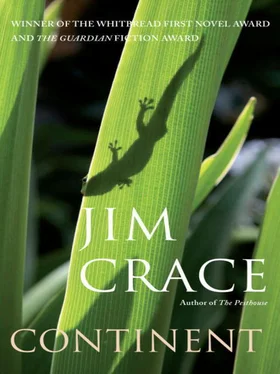I stood before the peeling mirror on the wall of his study and smiled at my older self. Thin and dry and squeamish. I looked again at that family photograph and wondered at the girl encountered there, in her torn and spermy dress, the slight and bony exception of the beach. My mother and my sisters were broad and tall with heavy hips and wide-set, comfortable eyes. Even the Uca felix were wide and swollen for the solstice.
Then the bulbous women and the girl in the cotton dress and the service gloves, that slight, pale teenager with the empty tray and the smile and the fessandra blooms, looked out at me from the other fading prints. Who — in my position, with my dismay — would not hurry now to unearth those charts again, to match her dates and mine, to sit lifeless in that chair (where she had sat, her face flushed, her breasts swollen, her acids flowing), to shut both eyes and hear those doves take wing, vabap-vabap, the shingle and the crabs, the baying of the donkeys left alone and tethered in the ardour of the night, the closing of a study door?
I USED ONCE to have a calligrapher’s booth in the marketplace. Bridegrooms came and I blessed their marriage certificates with the name of God in gold-leaf. I provided decorative alphabets for elementary schools and delicate pillow-prayers on silk for the superstitious. The old came to my booth and detailed their sins and virtues. I inscribed them into a list on parchment soaked in ambergris and sealed them into a tube of bamboo. So when the old were dead, their Sins and Virtues were burned with them.
I was the only calligrapher in the city who possessed the franchise to profit from Sins and Virtues. It provided great business but precluded me from marriage and fornication. That was the custom and the regulation. The sin-lister must be free from sin.
Later, when business superseded religion as the preoccupation of our people, I decorated shop fronts and designed letterheads for ambitious greengrocers and ice-vendors. I prepared boastful posters for the first cinema, ornamental scrolls for lofty institutions and fancy gate-plates for embassies. My work on parchment was etched and woven and carved into more durable materials by craftsmen in Europe. I extended my booth and employed an apprentice to mix my inks and to deliver my work. But that was long ago. Now I am nearly dead. The acacia which my uncles planted in their village at my birth (its name in Siddilic signifies ‘Patience’) has almost lost its leaves. Only one branch draws sap. The rest is the home of ants.
I DO NOT now go into the market. I spend my days almost entirely within the walls of this echoing and lizard-infested house. I start work each day at my Morning Desk, which faces eastwards towards the river. At noon I dine on some delicacy — a modest snack of grilled perch or, when they are seasonable, locusts. I no longer eat red meat or drink wine. My head and my stomach are too vulnerable. A little honey water is sufficient. Or some sweet mint tea. I sleep for an hour or so beneath my one fan. My house gecko joins me, lying across my bare chest like a damp medallion.
In the afternoon I move to my Afternoon Desk, facing into the sun of the courtyard and the evergreen of the oleander. I burn a stick of fine cinnamon to keep the devils at bay. An old habit. I work until moonrise and then eat again: some tomatoes or beans with a little sour bread, followed by a mango or guava or a fruit milk-shake from the machine at the shop on the corner. I change my white day clothes — now soiled with pips and juice and crumbs — and put on heavier evening wear for my third work shift at the Evening Desk in the inner room. If I want some ink, perhaps, or some small delicacy, then I send Sabino, who was my boy apprentice and is now my factotum, to the market and to the new air-conditioned stores.
I myself have withdrawn from the marketplace. I am now too grand for marriage certificates and shop fronts and lofty institutions. What I did for the price of an olive in my youth I will not now consider even for an orchard of olive trees. I have made my small fortune and, in what time there is left, I am looking for inner meanings. I am the last and certainly the most distinguished of calligraphers in the old Siddilic script but I am done with weaving and ennobling letters, of chasing their edges into the corner of the page. Now I am a doodler. Every leaf of gold-foil counts for me as an acacia leaf. I am in no hurry to use up my supply. I work three shifts from habit, from boredom and to exercise the arthritis in my hands. My mind is elsewhere, searching out material for my last work, to be burned at my funeral.
THEY CALL my craft Art these days and pay great sums for it. Last month a collector from Chicago offered Duni the ironmonger three thousand dollars for his ancient shop front with my flaking age-old letters. I went down to the marketplace on Sabino’s arm to witness the dismantling.
‘We’ll take great care of it, sir,’ the American told me, cracking my frail hands between his own. ‘We’re going to restore it, right? We’re going to give it a fresh lick of paint and we’re going to put it on show in the Museum of Ethnography. The people of America will be able to see your work. Back home, artists and historians are just beginning to appreciate the subtleties of Siddilic. This is such a beautiful piece.’ He stood back and admired Duni’s shop front. ‘Wonderful,’ he said. ‘Sir, I am proud to be acquainted with you.’
Three thousand dollars! Duni had paid me for the work with cooking pots. ‘DUNI EMPIRE’, I had written on his instruction, ‘POTS, TOOLS, SEEDS, BICYCLES AT FAVOURABLE PRICES. TOILET SUPPLIES’. I pray for the people of Chicago.
WORD HAS spread that Americans are buying up shop fronts. Enterprising businessmen have purchased them and are storing them for museums and universities abroad. Old ladies have been digging in their treasure trunks for old marriage certificates marked in gold by my brush. Embassies have placed guards on their gate-plates. The cinema manager is cursing his lack of foresight. Back-street charlatans have turned their energies from pimping and fortune-telling to forgery. The market is full of false shop fronts: fake greengrocers, tinkered tailors.
Visitors from America and Europe can buy mass-produced pillow-prayers in warped and clumsy Siddilic. In the marketplace, as in Chicago, the ancient characters of Siddilic have lost their meaning. The only care the forgers take is with my signature and, because their hands are young, these signatures are now better than my own.
Sabino is growing rich on the pickings from my waste-basket. Dollars cannot tell doodles from the name of God.
THERE HAS been some excitement in my small street. A government minister has come expressly to see me. First of his entourage to arrive was his head of protocol, a young gum-chewing aide-de-camp. He was a stickler for procedure. First, he distributed with a sweep of his arm a handful of coins to the beggars and children of our quarter. He shook some hands. He kicked some backsides. Nothing was too much trouble for him. He would be back in twenty minutes, he explained, with the Minister and with more handfuls of cash. Ministerial protocol demanded an eager crowd.
I was taking my siesta. ‘Do not wake your employer,’ he instructed Sabino. ‘The Minister likes surprises. But tidy the house.’ He placed one of his men outside the front gate to my house and another in the back yard. Then he radioed from his army jeep that the street was now ready for the Minister’s casual arrival. I slept peacefully and dreamt of my booth.
Sabino conducted the Minister into my room. I woke to their whisperings and shufflings and the scrape of the proffered chairs. But I kept still and listened. The Minister sat, chewing some of his aide’s gum, and waited for me to stir. My gecko backed furtively up my chest towards my throat. The Minister was a patient man. He enjoyed the advantage of arriving unannounced and being kept waiting.
Читать дальше












